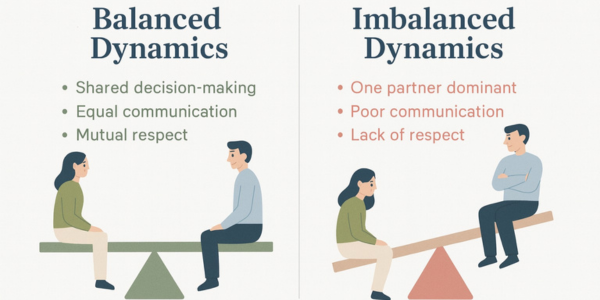Relationships are built on trust, respect, and mutual understanding—but when one person holds significantly more influence or control than the other, a power imbalance in relationships can develop. These imbalances are not always obvious at first. Sometimes they show up as subtle patterns of decision-making, communication, or emotional dependence. Other times, they are clear and harmful, leaving one partner feeling unheard, controlled, or diminished.
In this guide, we’ll explore the meaning of power imbalance in relationships, how to spot it, and ways couples can restore balance. We’ll also discuss how therapy can provide support and tools for change.
What is a power imbalance in a relationship?
A power imbalance in a relationship occurs when one partner consistently has more control, influence, or authority than the other. This can appear in many forms—emotional, financial, sexual, or social. For example:
-
One partner always makes decisions without considering the other.
-
One person controls the finances, leaving the other dependent.
-
A partner dismisses feelings or opinions, minimizing the other’s voice.
While some natural differences exist in any partnership, a true imbalance becomes problematic when it undermines equality and mutual respect. Healthy relationships thrive on give-and-take, but power imbalances often create one-sided dynamics.

How do you identify a power imbalance in a relationship?
Identifying a power imbalance in relationships requires looking at patterns, not just isolated events. Some key questions to ask include:
-
Who usually makes important decisions?
-
Does one partner feel unable to express their needs or opinions freely?
-
Are responsibilities (emotional, financial, household) divided fairly?
If you find that one person consistently carries more control, it may signal imbalance. Infographics comparing balanced vs. imbalanced dynamics can make this clearer—for example, a balanced relationship shows shared decision-making, while an imbalanced one shows dominance by one partner.
What are the signs of an unhealthy power dynamic?
Signs of an unhealthy power dynamic often overlap with patterns of emotional or psychological control. Watch for:
-
Lack of autonomy: One partner feels trapped or unable to act independently.
-
Manipulation or guilt: Decisions are influenced by fear, guilt, or pressure.
-
Communication breakdown: One voice dominates conversations, while the other is silenced.
-
Control of resources: Money, time, or social connections are restricted.
-
Fear of conflict: One partner avoids speaking up due to fear of retaliation.
These signs can take a toll on mental health, leading to anxiety, low self-esteem, and even depression. The longer they persist, the harder it can be to break the cycle.
(Internal link idea: “Read more about setting healthy [boundaries in relationships].”)
How can couples address power imbalances?
Addressing a power imbalance in relationships starts with honest communication and a willingness to change. Here are a few steps couples can take:
-
Acknowledge the imbalance – Naming the issue is the first step. Both partners need to admit that the current dynamic isn’t working.
-
Practice open communication – Encourage dialogue where both voices carry equal weight. Tools like active listening or “I statements” can help. (Internal link: “Explore more on [effective communication in relationships].”)
-
Redistribute responsibilities – Whether it’s finances, parenting, or chores, balance comes from sharing duties fairly.
-
Set boundaries – Healthy boundaries protect both partners’ individuality. (Internal link: “Learn about [why boundaries matter in couples therapy].”)
-
Check in regularly – Balance is not a one-time fix; it requires ongoing attention.
Couples who approach imbalance as a team are more likely to strengthen their relationship rather than drift apart.
Can therapy help fix a power imbalance in a relationship?
Yes—therapy can be a powerful tool in addressing power imbalances in relationships. A therapist provides a neutral, supportive space where both partners can:
-
Recognize unhealthy patterns without blame.
-
Learn communication strategies that restore equality.
-
Explore underlying causes, such as childhood experiences or cultural norms.
-
Develop actionable steps to create a healthier dynamic.
Couples therapy, in particular, helps shift the focus from “who’s right” to “how can we work together.” By involving a trained professional, couples are more likely to find sustainable solutions and avoid repeating harmful cycles.
Causes of Power Imbalance
Understanding what leads to imbalance is important for prevention. Common causes include:
-
Financial dependence
-
Cultural or gender role expectations
-
Personality differences (dominant vs. passive)
-
Past trauma influencing control needs
Recognizing these root causes helps couples address not just the symptoms, but the underlying issues.
Effects on Mental Health
When left unaddressed, power imbalances can negatively impact mental health. Partners may experience:
-
Increased stress and anxiety
-
Decreased self-worth
-
Fear of expressing needs
-
Emotional exhaustion
Healthy relationships should enhance well-being, not diminish it. This is why early recognition and intervention are key.
How to Rebalance Power
Rebalancing power requires intentional action:
-
Equality in decisions – Ensure both voices are considered.
-
Transparency – Share financial, emotional, and practical responsibilities openly.
-
Supportive behaviors – Validate each other’s feelings and encourage independence.
-
Professional help – Consider therapy when change feels difficult alone.
Over time, these actions can restore fairness and strengthen trust.
FAQ: Power Imbalance in Relationships

Is a power imbalance always unhealthy?
Not necessarily. Natural differences exist, but it becomes unhealthy when one partner consistently feels powerless or dismissed.
Can relationships recover from a long-term imbalance?
Yes, with effort, communication, and often therapy, couples can restore balance and rebuild trust.
Does power imbalance only happen in romantic relationships?
No, it can also occur in friendships, family dynamics, and workplaces.
Radically Open DBT Therapy in Portland Oregon
Therapy & nutrition for individuals experiencing anxiety, depression, eating disorders, OCD, and more.


